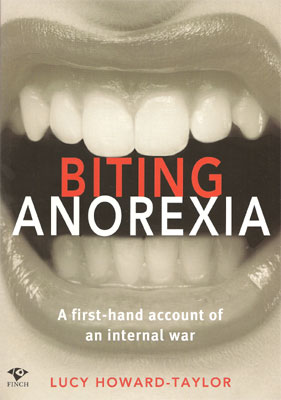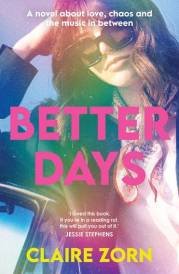Biting Anorexia

What most of us don't know about anorexia
* Anorexia is the most fatal of all psychiatric illnesses.
* It's a growing problem in our communities (Eating disorders have been o diagnosed in children - both boys and girls - as young as 8 years. Over 20% of all eating disorder patients are now male*.)
* The worst part of anorexia is the recovery.
* Most importantly, we don't know what it's like to have this illness.
Lucy Howard-Taylor wants to change that. She is the author of a new book, Biting Anorexia, which powerfully depicts the depths of horror that an anorexic can face. She wrote much of her book when she was 18, while in the grips of the condition.
'My name is Lucy. I am in recovery from anorexia nervosa and major depression, each of which almost killed me.
'I am 18 years old. I have starved myself silent. I have slipped through people and out of sight, into black. I sacrificed all of me in pursuit of a disease: a slapdash attempt at flawlessness, self-definition; a guiltless rejection of life. Rigid at night from fear, curled at another day, I fell; unmoved by the landing.
'But that was then and this is now, and I have bit and clawed my way back to myself. This is simultaneously a chronicle of my disappearance and a record of my rebirth: a crossing from black to greyscale to colour, in my own time and on my own terms.
'I now consider myself very nearly recovered. I was compelled to write my story for past and current sufferers and their families, their friends, teachers, doctors and colleagues - This is my apology; my story among thousands out there. I intend to have it heard.
'But this is not the exposé of an individual. This is a chronicle. Of anorexia. Of depression. Of you and me, perhaps. And a stumble back into the light.'
Anorexia is often inaccurately portrayed as a phase that some young girls, obsessed by their appearance, go through. The realities of the illness prove that nothing could be further from the truth. As Lucy states in her powerful depiction of the condition: 'Forget about misguided notions of vanity and thin models, this is what anorexia is really about .... [Anorexia] isn't about weight, or a diet or a figure. Somewhere along the line I've come to equate fat with failure and weakness.
Weight loss is merely symptomatic of the greater psychological problem.'
Recovery from the condition is the hardest, most challenging and most confusing part, and the one least written about. As Lucy writes: 'To challenge an eating disorder, or any mental illness, is to wage a prolonged, painful and devastating war - it is the most confusing and emotionally draining part of the illness.'
About the author
Lucy Howard-Taylor, now 19 years old, is studying English/Law at Sydney University and is a talented photographer and published poet. Last year she edited Australia's oldest literary journal, Hermes, while this year she will take on the university women's law journal Yemaya. In between writing articles for the campus newspaper, she likes to eat cinnamon toast and dreams about studying at Oxford.
* The Butterfly Foundation
Biting Anorexia
A first-hand account of an internal war
Finch Publishing
Author: Lucy Howard-Taylor
ISBN 9781876451929
RRP: $24.95
Interview with Lucy Howard-Taylor
1. What was your inspiration behind this book?
I wanted to sort myself out. I couldn't understand what was wrong, and I wanted to. It began as my diary. There was an element of perfectionism involved, of course: the careful detailing of everything that I had eaten and done that day, and the next. I thought that if I could write about myself, I could learn about myself. Later, when I gave my diary to my mum to read, my intention was to have her understand me and my disorder. It was only when she suggested that I keep it in case I wanted to publish it in a few years time that I realised I could use what I was writing to perhaps alleviate some of the terrible isolation inherent to an eating disorder and depression, and felt deeply by all sufferers. I thought that by documenting my own recovery I could give other people in the black depths of the illness a kind of 'hope'.
2. Are there early detection signs of anorexia?
What people tend to not understand about anorexia is that weight loss is merely one of the symptoms of the underlying illness. As such, somebody can be severely anorexic, but not emaciated - indeed, they can be at a normal weight. It is a mental disorder first and foremost, so it will naturally manifest itself psychologically in many cases before weight loss even starts. The earlier signs insofar as they pertained to me would have been an intense feeling of social inadequacy, a low sense of worth, high self criticism and rampant perfectionism.
3. What are the initial steps that need to be taken when you realise a family member or friend is suffering from anorexia?
The most important thing is to say something. Too many of my close friends just looked the other way, and their lack of a response just normalised my escalating behaviours. Don't get angry or try to give advice, just register your support. Ask them how they're feeling. Let them talk, and most importantly, do not judge them. Let them know that if they wish to speak, or have a cry, or just need a hug, that they can come to you, and not be pressured or lectured.
4. What are the long-term effects of anorexia?
Heart problems, low bone density (leading to early osteoporosis), nerve and organ damage, infertility, receding gums and tooth damage, depression and anxiety disorders and permanently stunted growth, amongst other things. It is unclear whether the brain ever completely recovers. What is perhaps most dangerous, is the high chance of relapse.
5. How can parents decrease the chances of their child becoming anorexic?
It is difficult to say. It is important is to foster a healthy attitude to food. Children learn from their parents, so if you have issues with eating, your children will adopt them. Equally important is building a child's self esteem and sense of worth, and ensuring an environment of acceptance and acknowledgement at home. However, if it were that easy, I would not have developed anorexia. I had a wonderful upbringing and the best mum and dad in the world. Still, there are ways to lessen the risk.
6. What type or books (or authors) do you like to read when you are not writing yourself?
I'm reading Dickens' The Old Curiosity Shop at the moment, and have just finished Wuthering Heights for the umpteenth time. Richardson's Pamela is next on my list, followed by Ayn Rand's Anthem. Virginia Woolf and F Scott Fitzgerald are probably my favourite authors… although I do love Daniel Defoe and Gabriel Garcia Marquez. Oh and Milan Kundera - he is just brilliant.
7. How lengthy was the process behind writing & researching 'Biting Anorexia'?
If you take into consideration the length of time over which I wrote my diaries, transcribed them onto my computer, sorted through them, rewrote parts, and then knitted them together into the book that is 'Biting Anorexia', you would be looking at about six years. I did write the first draft of the book in a feverish 24 hours a couple of years ago (and while I was still very ill), but it has taken me a little over two years to edit the manuscript to a point where I was satisfied just to leave it.
5. What is your message to friends & family of an anorexia sufferer?
To the family and friends: don't turn your back, and do offer your support. Most important is to recognise that your old friend, child or sibling hasn't gone - they're still in there, but are being dictated to and controlled by a disease. To the sufferers: nothing is permanent. Don't give up hope. And lastly, things will get worse before they get better, but by God, when they get better - you'll realise just how much of a poor substitute for life living with an eating disorder is. Life is wonderful, and I can say that only now that I am on the other side.
Quick Questions:
Full name: Lucy Howard-Taylor
Nickname: Luce.
Star sign: Virgo.
Book category: I like classic English literature best of all, I think.
Favourite food: Now that's tough! It changes at any given time. At the moment I'm craving apple crumble.
Favourite film: Definitely 'Out of Africa'.
Favourite actor: Cate Blanchett, followed very rapidly by Helena Bonham Carter.
Pets: One beautifully fat cat (Cleo), and one beautifully fat dog (Wobby).
Describe yourself in 3 words: mulish and pensive.
Hobbies/interests: Reading, eating and napping in the sun. Also photography, writing, and smelling things.
First job: Babysitting unbelievably naughty children.
What can you never leave home without: Vaseline!
What is the first thing you think of when you wake up in the morning: I must admit, the first thing I think of is always the cereal I'm going to have for breakfast.
MORE
- Melanoma treatment
- Positive
- Chickenpox Vaccination
- Treatment for Advanced Liver Cancer
- Genetic link to depression in Huntington's disease
- Electronic Prescriptions
- Aussies Waking Up to Allergies
- managing type 2 diabetes
- Kidney Watch Early Detection
- Kidney Watch High Blood Pressure
- Sleep Loss and Daytime Performance



